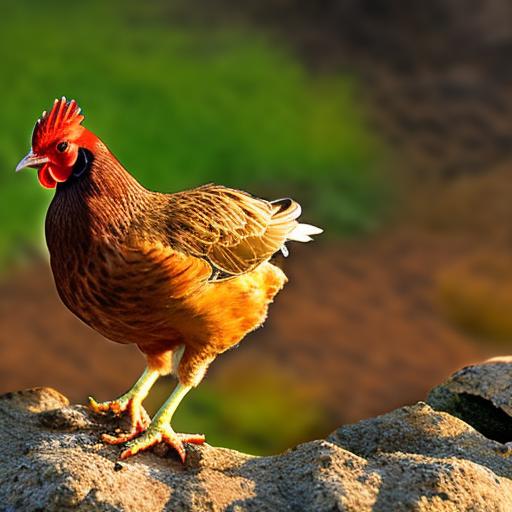Keeping chickens without a coop, also known as free-range chicken keeping, is a growing trend among backyard chicken enthusiasts. Instead of confining chickens to a coop or run, free-range chicken keeping allows them to roam freely in a secure yard. This practice mimics the natural behavior of chickens and provides numerous benefits for both the chickens and their owners.
Key Takeaways
- Keeping chickens without a coop is a viable option for those who want to raise chickens in a more natural environment.
- Benefits of keeping chickens without a coop include healthier and happier chickens, better quality eggs, and reduced costs.
- Factors to consider before keeping chickens without a coop include local laws and regulations, predators, and the size of your yard.
- Preparing your yard for free-range chickens involves creating a safe and secure environment, providing shelter, and ensuring access to food and water.
- Choosing the right breed for free-range living is important, as some breeds are better suited to living without a coop than others.
Benefits of Keeping Chickens Without a Coop
One of the main benefits of free-range living for chickens is improved health. When chickens are allowed to roam freely, they have access to a more varied diet, including insects, worms, and grass. This natural diet helps to improve their overall health and can result in better egg quality. Free-range chickens also have the opportunity to engage in natural behaviors such as scratching and dust bathing, which helps to keep them mentally and physically stimulated.
In addition to the benefits for the chickens, keeping chickens without a coop can also be advantageous for the owner. One of the main advantages is reduced costs. By allowing chickens to forage for their own food, owners can save money on feed costs. Free-range chickens also tend to require less maintenance compared to those kept in a coop, as they have more space to roam and are less likely to develop behavioral issues associated with confinement.
Factors to Consider Before Keeping Chickens Without a Coop
Before deciding to keep chickens without a coop, there are several factors that need to be considered. First and foremost, it is important to check local laws and regulations regarding backyard chicken keeping. Some areas may have restrictions on the number of chickens allowed or require permits.
Another important factor is having a secure yard. Chickens are vulnerable to predators such as foxes, raccoons, and hawks. It is essential to have proper fencing in place to keep predators out and ensure the safety of the chickens. Additionally, adequate space is necessary for free-range chickens to roam and engage in natural behaviors.
Preparing Your Yard for Free-Range Chickens
Preparing your yard for free-range chickens involves several key steps. First and foremost, it is important to have a secure fence in place to keep predators out and chickens in. The fence should be buried at least a foot deep to prevent predators from digging under it. Additionally, the fence should be tall enough to prevent predators from jumping over it.
Providing shade and shelter is also crucial for free-range chickens. Chickens need protection from extreme weather conditions such as heat, cold, and rain. This can be achieved by providing trees or other structures that offer shade and shelter. It is also important to provide a designated area for dust bathing, as this is a natural behavior for chickens and helps to keep them clean and healthy.
Choosing the Right Breed for Free-Range Living
When choosing a breed for free-range living, it is important to select a breed that is well-suited for this type of environment. Some breeds are more independent and better at foraging than others. Breeds such as Rhode Island Reds, Australorps, and Sussex are known for their ability to thrive in free-range settings.
It is also important to consider the climate in your area when choosing a breed. Some breeds are better suited for colder climates, while others are more heat-tolerant. Doing research on different breeds and their specific needs will help ensure that you choose the right breed for your free-range flock.
Feeding and Watering Free-Range Chickens

While free-range chickens have the opportunity to forage for their own food, it is still important to provide them with a balanced diet. This can be achieved by offering a high-quality chicken feed that is specifically formulated for laying hens. In addition to feed, free-range chickens can also benefit from supplemental foods such as fruits, vegetables, and kitchen scraps.
Water is also essential for free-range chickens. It is important to provide clean, fresh water at all times. This can be achieved by using a waterer that is designed for chickens and is easy to clean and refill.
Providing Nesting Areas for Free-Range Chickens
Even though free-range chickens have the freedom to roam, they still need a designated area for nesting. Providing nesting areas is important for encouraging hens to lay their eggs in a safe and secure location. This can be achieved by providing nesting boxes or creating natural areas with suitable materials such as straw or wood shavings.
Protecting Free-Range Chickens from Predators
Protecting free-range chickens from predators is crucial for their safety and well-being. There are several steps that can be taken to deter predators and keep chickens safe. One of the most effective methods is to have a secure fence in place, as mentioned earlier. Additionally, it is important to remove any potential hiding spots for predators, such as tall grass or brush piles.
Other deterrents include using motion-activated lights or sprinklers, as well as placing reflective objects around the yard to scare away predators. It is also important to lock up chickens in a secure coop at night when they are most vulnerable to predators.
Health and Hygiene for Free-Range Chickens
Maintaining good health and hygiene is essential for free-range chickens. Regularly inspecting the flock for signs of illness or injury is important for early detection and treatment. It is also important to provide regular dust bathing areas, as this helps to keep chickens clean and prevent mites and other parasites.
In addition to regular inspections, it is important to practice good biosecurity measures to prevent the spread of diseases. This includes keeping the coop and yard clean, providing clean bedding, and regularly disinfecting feeders and waterers.
Is Keeping Chickens Without a Coop Right for You?
Keeping chickens without a coop can be a rewarding and fulfilling experience for both the chickens and their owners. It allows chickens to live a more natural and healthy lifestyle, while also providing numerous benefits for the owner, such as reduced costs and less maintenance.
However, it is important to carefully consider the factors mentioned in this article before deciding to keep chickens without a coop. Checking local laws and regulations, ensuring a secure yard, and choosing the right breed are all crucial steps in successfully keeping free-range chickens.
If you are considering keeping chickens without a coop, there are many resources available to help you get started. Local agricultural extension offices, online forums, and books on backyard chicken keeping can provide valuable information and guidance. By doing your research and taking the necessary steps to prepare your yard and care for your chickens, you can enjoy the benefits of free-range chicken keeping.
If you’re considering keeping chickens without a coop, you may want to read this informative article on the benefits of using a SnapLock chicken coop. The SnapLock chicken coop, featured on Poultry Wizard, offers a secure and convenient solution for housing your feathered friends. With its easy assembly and durable construction, this coop provides a safe environment for your chickens while allowing them to roam freely. Check out the article at https://poultrywizard.com/keeping-chickens/snaplock-chicken-coop/ to learn more about this innovative coop option.
FAQs
What is a chicken coop?
A chicken coop is a shelter or housing structure designed for chickens to live in. It provides a safe and secure environment for chickens to roost, lay eggs, and protect them from predators.
Can you keep chickens without a coop?
Yes, you can keep chickens without a coop, but it is not recommended. Chickens need a safe and secure place to roost and lay eggs, and a coop provides that. Without a coop, chickens are vulnerable to predators and the elements.
What are the risks of keeping chickens without a coop?
Keeping chickens without a coop puts them at risk of being attacked by predators such as foxes, raccoons, and birds of prey. Chickens also need protection from the elements, such as rain, wind, and extreme temperatures.
What are the alternatives to a traditional chicken coop?
There are alternative housing options for chickens, such as a chicken tractor or a mobile coop. These structures provide a safe and secure environment for chickens while allowing them to graze on fresh grass.
What are the benefits of keeping chickens in a coop?
Keeping chickens in a coop provides a safe and secure environment for them to roost, lay eggs, and protect them from predators. It also makes it easier to collect eggs and keep the area clean. Additionally, a coop can help prevent chickens from wandering into areas where they may cause damage or become a nuisance.
Meet Walter, the feathered-friend fanatic of Florida! Nestled in the sunshine state, Walter struts through life with his feathered companions, clucking his way to happiness. With a coop that’s fancier than a five-star hotel, he’s the Don Juan of the chicken world. When he’s not teaching his hens to do the cha-cha, you’ll find him in a heated debate with his prized rooster, Sir Clucks-a-Lot. Walter’s poultry passion is no yolk; he’s the sunny-side-up guy you never knew you needed in your flock of friends!







